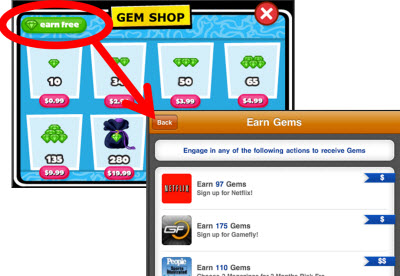 Tapjoy is announcing today that it helps monetize more than 10,000 mobile apps on the iPhone and Android mobile devices.
Tapjoy is announcing today that it helps monetize more than 10,000 mobile apps on the iPhone and Android mobile devices.
That’s a significant number and it means that at least that many apps have begun using the freemium, virtual currency business model that Tapjoy espouses. It also suggests that, since many of the apps are on the iPhone, that Tapjoy hasn’t suffered a huge crash in its business after its recent spat with Apple.
And if San Francisco-based Tapjoy hasn’t crashed and burned, that means that many of Apple’s developers have found a way to make money in the wake of Apple’s ban on Tapjoy-based incentivized installs. A number of observers feared that was the case.
To recap, Apple banned Tapjoy and other incentivized installs — where a user gets a coveted virtual good in a game if he or she will install another app — because it felt that developers were paying Tapjoy to boost themselves onto the top 25 lists of most popular apps, where they benefited from huge visibility. Tapjoy said that Apple was being unfair and it was ignoring the fact that teens, kids and others used the incentivized installs because they didn’t have money to pay for virtual goods. It was a legitimate way for advertisers to reach those kids and a great way for developers to advertise and make money. But Apple didn’t relent on the change and Tapjoy invested heavily in the Android platform.
Christine Lee, vice president of developer relations, said in an interview that Tapjoy pivoted away from the incentivized installs on the iPhone to other business models on the iPhone, such as offers, where a user can receive a virtual good if he or she agrees to watch a movie trailer or sign up for services.
On top of that, Tapjoy benefited from a big increase in its incentivized install business on the Google Android platform, where the incentivized install is not banned, said Chris Akhavan, vice president of developer partnerships, in an interview.
“We’ve seen explosive growth on Android,” Akhavan said.
Mihir Shah, chief executive of Tapjoy, said in a statement that developers say that a third of their total revenue comes from Tapjoy-based revenues.
Among the newest developers using Tapjoy to make money from mobile games are OMGPOP, Moblyng, Craneballs Studios, Game Circus, Spry Fox and others. Tapjoy said it reaches more than 30 million daily active users and delivers a million ad completions a day for app developers and brand advertisers.
Tapjoy has raised more than $70 million to date and it has about 80 employees. Investors include J.P.Morgan Asset Management, Rho Ventures, North Bridge Venture Partners, InterWest Partners and D.E. Shaw Ventures.
VentureBeat's mission is to be a digital town square for technical decision-makers to gain knowledge about transformative enterprise technology and transact. Learn More
